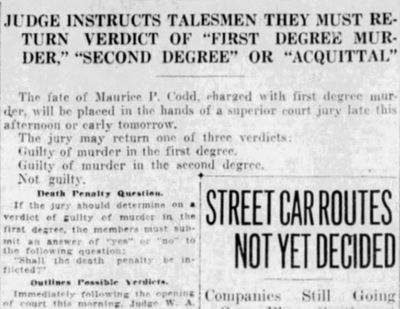This column reflects the opinion of the writer. Learn about the differences between a news story and an opinion column.
100 years ago in Spokane: Maurice Codd’s fate hung in the balance as the jury heard closing arguments in his murder trial, some moved to tears by the defense

The jury began deliberating in the Maurice P. Codd murder trial after Judge W.A. Huneke told them they had three choices: guilty of first-degree murder, guilty of second-degree murder or not guilty.
If guilty of first-degree murder, the jury would then have to decide whether to impose the death penalty.
Defense attorney Lester Edge delivered an emotional plea for acquittal in his closing argument.
“If Frank P. Brinton were alive today, I am sure he would stand before you and say, ‘Don’t convict Codd, it was my fault,’ ” Edge said. “There is no one in this courtroom or no one in this world who is a bit more sorry for Frank P. Brinton than Codd.”
In Edge’s closing argument, “tears filled the eyes of several jurors and spectators.” Tears streamed down Codd’s cheeks when Edge relayed how he attended his mother’s funeral while accompanied by a deputy sheriff. Edge said even if found not guilty, “the sorrow and grief” of “many things” will prey heavily on his mind.
The prosecutor, in his closing argument, said Codd was drunk and belligerent, and Brinton was merely trying to get him to leave. Codd threatened to throw Brinton over the railing – and then did exactly that.
When a witness told Codd he had “killed that boy,” he allegedly said he didn’t “give a damn.” It was, said the prosecutor, “a cold-blooded, deliberate murder” worthy of a verdict of murder in the first degree.
Also from the court beat: Rev. H.O. White, former pastor of the Laclede Baptist Church, lost his $30,000 slander suit against a Laclede lumberman.
The lumberman had told church members White was “immoral and unfit to preach the gospel.” The lumberman stood by his remarks and said that the truth was his defense.
The jury rejected the lawsuit, but said their decision was not based on if the pastor was immoral. It was based on whether the lumberman made his remarks with malice.